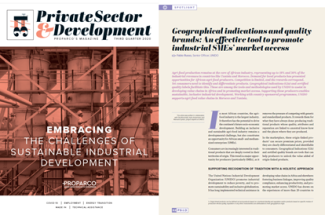Geographical Indications and Quality Brands at the spotlight of “Private Sector & Development”
UNIDO’s work on geographical indications and quality brands was at the spotlight of the latest issue of a magazine "Private Sector & Development". Under the title of "Geographical indications and quality brands: An effective tool to promote industrial SMEs’ market access", the article touches upon the advantages of promoting typical food products through certified quality labels for African small- and medium-sized enterprises (SMEs). Consumers are increasingly interested in traditional products that are deeply rooted in their territories of origin. This trend is a major opportunity for producers, as it removes the pressure of competing with generic and standardized products. In the marketplace, these origin-linked products can secure premium prices, provided they are clearly differentiated and identifiable to consumers. Geographical Indications (GIs) and certified quality brands are tools, which UNIDO promotes to help producers to unlock the value added of origin-linked products.
The article also introduces two case studies from the Programme for Market Access of Typical Products (PAMPAT), financed by the Swiss Secretariat of Economic Affairs (SECO), and implemented in Morocco and Tunisia. In implementing programmes like PAMPAT, UNIDO applies a holistic approach, including broadly related areas of intervention. The key element is “Quality and Origin”, which involves compliance with quality and safety specifications, and promoting labels across the value chain, buyers and consumers.
“Private Sector & Development”, issued quarterly by the French Development Agency - Agence Française de Développement (AFD), compares the views of experts in different fields on issues relating to the role the private sector plays in the development of low-income countries in the South, particularly in Sub-Saharan Africa. By comparing complementary approaches, Private Sector & Development aims to help get a better grasp of the mechanisms through which the private sector can contribute to the development of these countries.
For more information contact Fabio Russo (F.Russo [at] unido.org (F[dot]Russo[at]unido[dot]org))

